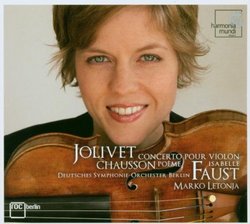A stellar interpretation.
Elfin F. Vogel | New York, NY United States | 09/19/2008
(5 out of 5 stars)
"Isabella Faust is a violinist to be watched, a huge, mature talent. Her playing has great warmth and life. Up to now, Francescatti was my favorite violinist for the Chausson, but now he has a rival."
Jolivet the off-the-beaten-track discovery and a fine interp
Discophage | France | 04/04/2010
(5 out of 5 stars)
"Although he was championed by the most famous musicians (including Rostropovich, André Navarra, Jean-Pierre Rampal, Lily Laskine and Maurice André) and he far from poorly represented on CD, I am not sure that, almost 35 years after his death, André Jolivet (1905-1974) enjoys the recognition he deserves. One of the rare pupils of Varèse, he was less radical than his teacher, and not radical enough for the Darmstadt and Donaueschingen twelve-tone avant-garde, but still too radical for the traditionalists, likely to consider that Honegger was as far as they'd be dragged. Only his two Trumpet Concertos have clinched a fringe position in the standard repertoire.
The Violin Concerto is a late work (1972) and a formidable one too. It was written for Leonid Kogan, who pulled out on account of illness (sure!). It was premiered by Georg Solti, who was then music director of the Paris Orchestra, and the orchestra's first violin, Luben Yordanoff. I believe this is its first recording. It is difficult to pinpoint Jolivet's style - he was an independent. It is less shimmering, more angular and raw than Dutilleux, reaching the kind of intensity and even brutality that you can find in Berg or Schoenberg (try the beginning of the finale). In the more agitated section of the second movement, there are woodwind shrieks that recall Varèse. Some oriental-sounding melismatas in the first movement vaguely recall Enescu. Jolivet's abiding fascination for the ritualistic and shamanistic powers of music is much in evidence, swaying between the brutal and the mysterious-sensuous. For those who know his seminal piano cycle Mana from 1935, it is much in the same vein, but in orchestral attire.
Chausson's Poem comes as a nice but not stylistically very coherent bonus. There, I like Faust's flowing tempos - not quite as swift as Heifetz' (Heifetz: Showpieces or Heifetz Showpieces), but like him she proves that the piece's searing lyricism doesn't need the kind of "fin-de-siècle" languid lingering that a certain tradition has brought to it to fully unfold (the caricature here being Christian Ferras' early recording, French Violin Masterpieces). Yes, unlike Heifetz, she manages to remain gentle and lyrical rather than urgently passionate and dramatic in the some of the more intense sections (like the passage starting at 5:03 or again the passage in double stops at 7:03). I personnaly prefer it when the music has a touch more passionate urgency and drama, but Faust's is an entirely valid view. She plays with a fine and luminous tone. It is my first encounter with conductor Marko Letonija, but he provides sympathetic support.
So the one big drawback is the short TT of 48:00. Given the interest of the Jolivet and the quality of the interpretation of the Chausson, I can live with it.
"


 Track Listings (4) - Disc #1
Track Listings (4) - Disc #1